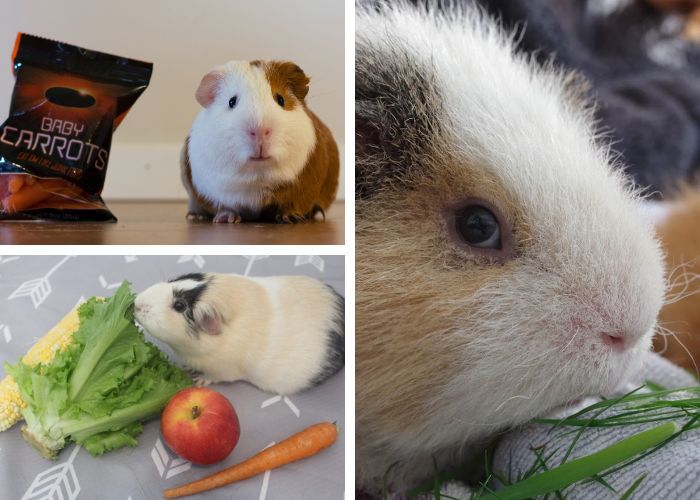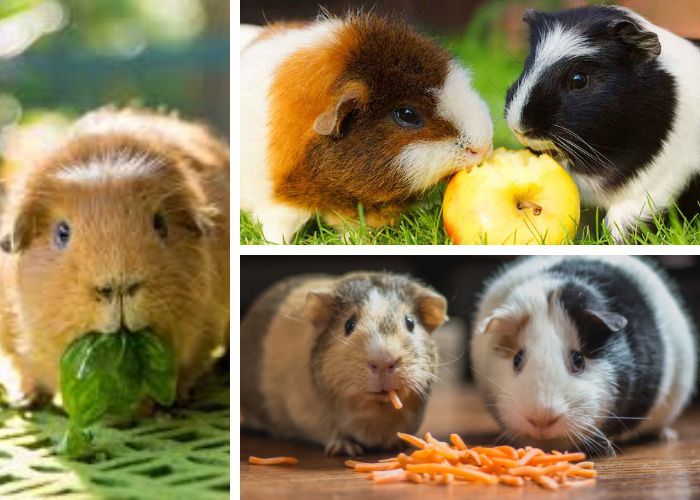Natural and Healthy Guinea Pig Treats to Keep Your Friends Fit
Are you looking for something extra special to treat your fluffy little Guinea Pig? In this blog, we are going to tell you some easy and delicious recipes that will have even the pickiest of guinea pigs begging for more!

Guinea pigs are adorable, sociable pets that bring joy to their owners with their playful antics and endearing personalities. As a responsible pet owner, you want to ensure that your furry friend enjoys a diet that's not only nutritious but also full of variety. In this comprehensive guide, we'll explore the world of natural and healthy treats for guinea pigs, ensuring your little companion thrives.
Key Takeaways:
- Understand the importance of vitamin C and a well-balanced diet for guinea pigs.
- Discover a variety of fresh vegetables and fruits that are safe and healthy for guinea pigs.
- Learn how to responsibly incorporate treats into your guinea pig's diet without risking health issues.
The Basics of a Guinea Pig's Diet
Before diving into the fun world of treats, it's crucial to understand the foundation of a guinea pig's diet. Fresh hay, such as timothy hay, should be the cornerstone of their daily intake, providing essential fiber for digestive health. Alongside hay, a high-quality pellet food fortified with vitamins, especially vitamin C, is necessary as guinea pigs cannot produce this vital nutrient on their own.
Fresh Vegetables: A Daily Delight
Fresh vegetables are not just an occasional treat; they should be a part of your guinea pig's daily diet. Veggies like bell peppers, romaine lettuce, and carrots are packed with nutrients and can be given in small amounts each day. These foods not only provide variety but also contribute to the necessary intake of vitamin C and other vitamins.
Fruits: Sweet but Sparingly
While fruits are a source of enjoyment for many guinea pigs, they should be given in moderation due to their high sugar content. Small pieces of apple or banana can be offered once or twice a week as a special reward. Always remove seeds and pits, and stick to small amounts to prevent obesity and diabetes.
The Perils of Processed Treats
It's tempting to spoil your pet with store-bought treats, but many of these contain artificial sweeteners, added sugar, and empty calories that can lead to health issues like obesity and urinary problems. Instead, opt for natural, homemade options that are free from these harmful additives.
Hydration: Water is Key
Never underestimate the importance of clean, fresh water in your guinea pig's cage. It's essential for their overall health and aids in the digestion of fibrous foods. Check and refill their water bowl daily to ensure they stay hydrated.
The Right Way to Reward
Using treats as a way to bond with your guinea pig and teach them new tricks is a fun aspect of pet ownership. However, it's important to use treats as a supplement to their diet, not a replacement. Treats should be a tool to earn points with your piggy, not a staple of their diet. You can find out more about best treats for guinea pigs in our guide below.

Avoiding High-Calcium Foods
Guinea pigs are prone to developing bladder stones, so it's important to monitor their calcium intake. Foods high in calcium, like yogurt drops and certain types of greens, should be given sparingly or avoided altogether to prevent urinary issues.
Treats to Steer Clear Of
Some foods can cause more harm than good to your guinea pig. Items like candy, chocolate, and anything with caffeine or dairy should never be given to your pet. These can cause serious health problems and should be kept far away from their bowl.
Herbal Enhancements: A Natural Boost
Herbs can be a fantastic addition to your guinea pig's diet, offering not just variety but also a range of health benefits. When you shop at your local pet store or even in your garden, consider herbs like parsley, cilantro, or dill. These can be given in moderation and provide a well-balanced diet with an extra punch of flavor. It's important to introduce any new herb slowly to ensure your piggies can adjust without worry, and always check that the herbs are safe for guinea pig consumption.
Incorporating herbs into your guinea pig's daily routine can be as simple as sprinkling a small amount over their regular feed or mixing it into a homemade recipe. Not only do these herbs enhance the nutrition of their meals, but they also introduce new flavors that can stimulate your pet's appetite and curiosity. Remember, while dried herbs are convenient, fresh is always best to avoid any unnecessary additives and to ensure your small animals get the most out of these natural treats.
The Significance of a Well-Balanced Diet
When it comes to maintaining the health and happiness of your furry friend, understanding the intricacies of a guinea pig's diet is paramount. A well-balanced diet for these little animals is not just about providing them with enough food, but about ensuring the right mix of nutrients. Fresh hay should be the cornerstone of their daily intake, offering the fiber necessary for a healthy digestive system. Alongside hay, a measured amount of quality pellets can supplement their nutritional needs, providing a concentrated source of vitamins and minerals tailored for a guinea pig's unique requirements.
However, it's not just about what you feed them, but also how you feed them. Consistency is key in a guinea pig's diet, as sudden changes can upset their sensitive digestive tracts. Introduce any new foods gradually, and always observe your pet for any signs of distress. Remember, a well-balanced diet is a steady one, where each mealtime is predictable yet packed with the varied nutrients they need to thrive.
Dried Fruit: A Tasty Treat with Caution
Dried fruit might seem like a convenient and healthy treat option for your guinea pig, but it's a snack that should be offered with caution. While small amounts of certain dried fruits can be a tasty addition to a guinea pig's diet, they are often high in sugar and can lead to weight gain and dental problems if given in excess. It's essential to choose unsweetened and unsulfured varieties to avoid any harmful additives. For instance, a tiny piece of dried apple or banana can be a delightful treat, but always in moderation.
Moreover, it's crucial to balance these sweet treats with more nutritious offerings. Think of dried fruit as the dessert to a well-rounded meal of hay, fresh vegetables, and pellets. Always ensure that the primary components of your guinea pig's diet are in place before introducing these sugary extras. By doing so, you'll help your animal maintain a healthy weight and avoid the pitfalls of a diet too rich in simple sugars. Remember, a little goes a long way when it comes to dried fruit and guinea pigs.
The Importance of Chew Toys
Chew toys are not just for entertainment; they play a crucial role in the dental health of guinea pigs. These small animals need to gnaw on hard materials to keep their ever-growing teeth at a manageable length. Pet stores offer a variety of chew toys designed specifically for piggies, made from safe, untreated wood or other guinea pig-friendly materials. Always avoid toys with plastic, rubber, or any harmful substances that could cause health issues if ingested.
Providing a selection of chew toys on a daily basis allows your guinea pig to naturally wear down their teeth, preventing dental problems that can arise from overgrown incisors. You can even get creative and make DIY chew toys at home using cardboard or untreated wood blocks. By rotating different toys and textures, you'll keep your guinea pig engaged and cater to their natural chewing instincts, all while supporting their overall well-being.
Creating a Treat Schedule
To maintain a well-balanced diet, create a weekly treat schedule that includes a variety of fruits and veggies. This will help you keep track of what and how much you're feeding your guinea pig, ensuring they get the right nutrients without overindulging. You can read more about top 5 treats for your guinea pig in our blog below.

DIY Treat Recipes
Making your own guinea pig treats can be a fun and rewarding experience. Simple recipes using natural ingredients like pureed fruits and veggies can be frozen into small cubes for a refreshing snack. Just remember to keep the portions small and the ingredients healthy.
Understanding Treat Sizes
When it comes to treats, size matters. A good rule of thumb is to offer treats that are no larger than your guinea pig's head. This helps prevent overfeeding and ensures that treats remain just that—a treat, not a meal.
Monitoring Your Guinea Pig's Health
Keep an eye on your guinea pig's weight and behavior to ensure they're not experiencing any adverse effects from their treats. If you notice any signs of diarrhea, skin issues, or changes in appetite, consult your veterinarian to adjust their diet accordingly.
The Joy of Foraging
In the wild, guinea pigs forage for their food, which provides mental stimulation and exercise. Recreate this experience by hiding small amounts of treats around their cage for them to discover. This not only makes treat time more exciting but also encourages natural behaviors.
The Role of Vitamin C Supplements
If you're worried your guinea pig isn't getting enough vitamin C from their diet alone, consider a supplement. Consult with your veterinarian to find the right product and dosage to keep your piggy healthy and happy.
When Treats Go Wrong
It's easy to give in to those pleading eyes, but resist the urge to over-treat. Too many treats can lead to nutritional imbalances and health issues. Stick to the recommended amounts and frequencies to ensure your guinea pig's long and healthy life.
Engaging with Your Pet
Treat time is also bonding time. Use this opportunity to interact with your guinea pig, teaching them tricks or simply spending quality time together. This strengthens your relationship and makes treat time a highlight of their day.
Summary
Incorporating natural and healthy treats into your guinea pig's diet can be a delightful way to provide them with variety and enrichment. Remember to focus on fresh vegetables and fruits, avoid processed snacks with added sugars or artificial sweeteners, and monitor the size and frequency of treats. By following these guidelines, you can ensure your guinea pig enjoys a balanced diet while still indulging in the occasional treat.
FAQ Section
Q: How often can I give my guinea pig fruit as a treat? A: Fruits should be given in moderation, ideally once or twice a week. Stick to small amounts to avoid health issues related to high sugar content.
Q: Can guinea pigs eat store-bought treats? A: While some store-bought treats are safe, many contain unhealthy additives like added sugar and artificial sweeteners. It's best to opt for natural treats or make your own at home.
Q: What are some signs that I'm overfeeding treats to my guinea pig? A: Signs of overfeeding include weight gain, changes in stool consistency (like diarrhea), and reduced interest in their regular food. If you notice these signs, cut back on treats and consult your veterinarian.
If you are looking for the best treats for your guinea pig click the button below! We have put together our list of best treats that your guinea pig love for sure!

